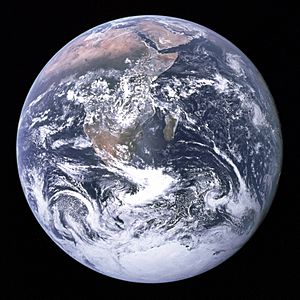Physical system facts for kids
In physics, a physical system is any object or part of an object that can be analysed with the laws of physics. An atom or the water in a lake can both be considered as physical systems. Everything outside the system is called the environment, which in the analysis is ignored except for its effects on the system.
All matter and energy in the universe could be treated as one big physical system, but often it is much much easier to look at the universe a few particles at a time, and treat these particles as their own quantum systems. There are many many different physical systems that physicists like to study. Some examples are:
- the Earth's atmosphere
- a falling object
- a hydraulic pump
- the wing of an airplane
- a glass of water
- a crystal or other solids
- the nucleus of an atom
- fundamental particles like quarks.
Physical systems are different to conceptual systems, which study theoretical objects, ideas or concepts (such as the Turing machine).
Related pages
See also
 In Spanish: Sistema físico para niños
In Spanish: Sistema físico para niños


